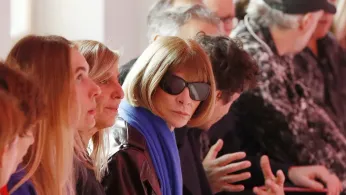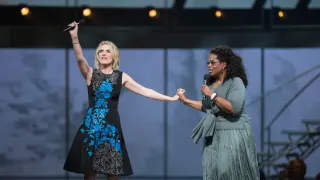
5 hours ago
Anna Wintour Reflects on Meryl Streep’s ‘The Devil Wears Prada’ Role
READ TIME: 2 MIN.
Anna Wintour, the famously private editor-in-chief of Vogue, has finally spoken in depth about Meryl Streep’s celebrated performance as Miranda Priestly in the 2006 film "The Devil Wears Prada" during a recent interview with journalist David Remnick on The New Yorker Radio Hour podcast. The conversation offers fresh insight into how Wintour perceives her fictional counterpart, as well as the lasting effects the film has had on both the fashion industry and broader audiences, including queer viewers .
When asked directly by Remnick whether she had felt “hurt” by the depiction of Streep's character, Wintour recounted attending the premiere dressed in in Prada without any real notion of what to expect. “I went to the premiere wearing Prada, completely having no idea what the film was going to be about.” She noted that her colleagues in the fashion industry were “very sweetly concerned” that the film might portray her as a caricature or in a negative light .
Rather than feeling slighted, Wintour described Streep’s performance as “fantastic,” emphasizing how the film balanced wit and humor. “And then I went to see the film, and I found it highly enjoyable and very funny. It had a lot of humor to it, it had a lot of wit,” she stated, dispelling rumors of personal offense and instead highlighting her appreciation of the craft .
Since its release, ‘The Devil Wears Prada’ has become more than just a fashion-centric movie; it is a touchstone for communities that see themselves in stories of personal reinvention, resilience, and the navigation of complex social hierarchies. The film’s sharp dialogue, glamorous settings, and the transformation of protagonist Andy Sachs have resonated deeply with queer audiences, who have long celebrated the film not only for its camp sensibility and strong female leads but also for its depiction of creative industries as spaces where queer people have historically found community and success. The character of Nigel, played by Stanley Tucci, stands out as a rare example of a nuanced gay character in mainstream cinema of the era.
Wintour’s comments underscore the complicated relationship between real-world fashion editors and their fictional representations. While the Miranda Priestly character was widely interpreted as a thinly veiled version of Wintour herself—down to the signature bob and icy demeanor—Streep’s portrayal brought unexpected nuance and humanity to the role. For many queer fans, Miranda’s unapologetic ambition and refusal to conform to gendered expectations of warmth or likability have rendered her an unlikely icon of empowerment.
Industry insiders have observed that the film helped demystify the inner workings of fashion, bringing visibility to a world where queer people have always played a crucial role. Queer fashion professionals interviewed in recent years frequently cite "The Devil Wears Prada" as both an inspiration and a reflection of their experiences breaking into elite circles that can be both exclusionary and liberating .






